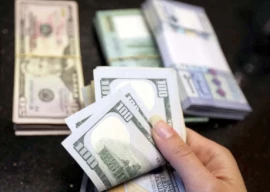
He then went on to explain the three common factors, which enabled 15 to 20 developing countries to gain prosperity since the Second World War. These included focusing on their people, forming alliances with other countries for trade facilitation and moving towards private-sector dynamics instead of depending on government support. The obvious implication was that for Pakistan to succeed, it would have to follow the same route.
Rs2 billion reserved for industrial waste treatment plants in new budget
Now that Shaikh has another opportunity to put Pakistan on the path to progress, one would have hoped that in his first budget, he would at least make a start in the above direction. Unfortunately, indications from the recent budget are that the country would be moving in exactly the opposite direction. Let us look at the first factor mentioned by Shaikh - the people. A look at the budget would reveal that human development has received no special consideration. The allocation for education, instead of being increased, has been cut by over 20% to Rs77 billion from the previous year’s already meagre amount of Rs97 billion.
Pakistan’s public expenditure (federal as well as provincial combined) on education, at 2.4% of gross domestic product (GDP), is the lowest even in the region. Similarly, allocations for the health sector have been drastically cut from about Rs14 billion in 2018-19 to Rs11 billion, a reduction of over 28%. If the budget had given any importance to human resources development, the allocations would have been increased instead of being cut.
Since the country is going through a difficult economic situation, such budgetary cuts could be understandable. However, the fact is that the total outlay of the budget 2019-20 at Rs8,238 billion is almost 39% higher than the budget estimate for 2018-19.
Furthermore, no other sectors (except some symbolic ones such as 10% reduction in ministers’ salaries) faced any reduction. The only sectors singled out for reduction are education and health. This clearly shows that the government does not see them as of any importance for economic welfare.
As for forming trade alliances with other countries, which is the second factor mentioned by Shaikh, the budget would further hinder rather than facilitate it. The two regional trade alliances that Pakistan is part of have not been functional since the day they were formed. These are the South Asian Free Trade Area (Safta) and the Economic Cooperation Organisation Trade Agreement (ECOTA), which were signed over 10 years ago.
Rs7.022tr budget for FY2019-20 sails through NA
With its small market size, Pakistan is not likely to succeed in becoming part of any major trading alliance. Perhaps, the only significant alliance with which it can have some form of free trade is the Association of Southeast Asian Nations (Asean).
Nevertheless, with the current trade and tariff policies, it is not likely that Pakistan would qualify to be part of this alliance. It bears mentioning that India has a successful free trade agreement with Asean.
The World Bank rates World Bank as the seventh most trade protectionist country in the world. In the recent budget, while some duties on raw material were reduced, this measure was more than offset by raising duties on over 3,000 other tariff lines, thus making Pakistan an even more inward-looking country. With such high tariffs, it is not likely that Pakistan can form any trade alliances.
Finally, for Shaikh’s third factor - moving towards dependence on private-sector dynamics rather than government support, the budgetary measures again point in the opposite direction. Government subsidies have been increased from Rs174 billion to Rs271 billion or an increase of over 55%.
Loss-making entities such as Pakistan Steel Mills are eating up government funds of billions of rupees. The steel mill has been closed for over four years and its liabilities are now over Rs465 billion and rising as the employees are regularly paid Rs400 million in monthly salaries.
Similarly, annual losses now incurred by Pakistan International Airlines (PIA) are in excess of Rs60 billion and accumulated losses exceed Rs400 billion. There seems to be no immediate plans to privatise them. It is not understood why such entities are still considered as national assets and not national embarrassment. All in all, it seems that the government is fully aware of what needs to be done to make Pakistan prosper but it has no political will or knowhow to take any steps to achieve this goal.




1719745858-0/BeFunky-collage-(1)1719745858-0-165x106.webp)

1730892765-0/Express-Tribune--(11)1730892765-0-270x192.webp)










COMMENTS (1)
Comments are moderated and generally will be posted if they are on-topic and not abusive.
For more information, please see our Comments FAQ